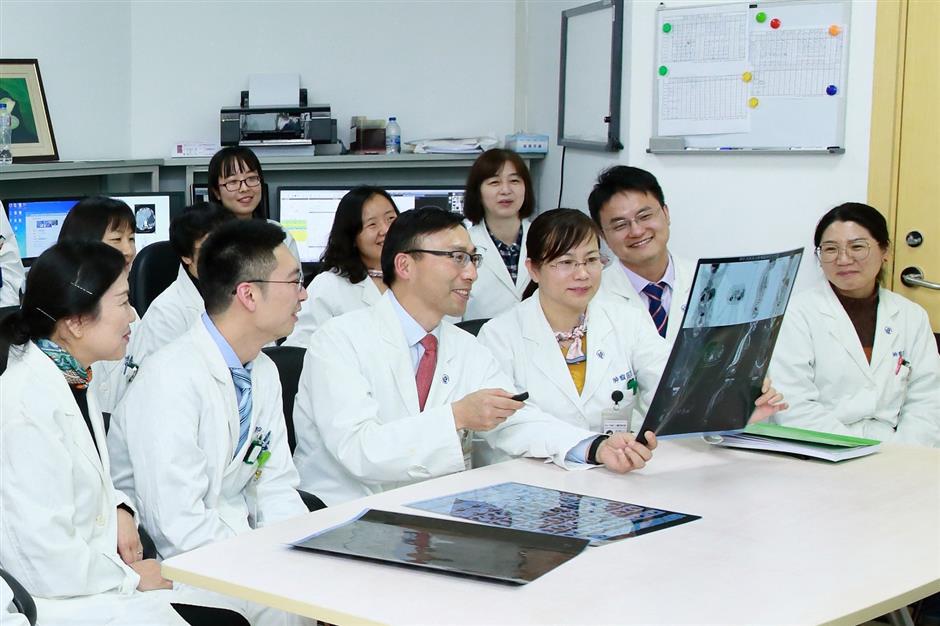Government News
Doctor's pioneering research can light up hidden cancers 2024-03-19
Nuclear medicine is often seen as a special and mysterious hospital department and generally not something familiar to ordinary patients. However, it is providing some of the most pioneering technologies in healthcare and is close to making personalized and precise cancer medicine a reality.
At Fudan University Shanghai Cancer Center, the home of Shanghai Engineering Research Center for Molecular Imaging Probes, nuclear-powered molecular tumor imaging agents are showcasing how nuclear medicine can be used to tackle the most trenchant condition in modern healthcare: cancer.
"We have developed over 30 sets of nuclear medicine probes, which are highly expressed in different types of cancers and are able to identify tumor invasion, metastasis, and prognosis, especially after other medical measures have failed to see the lesion, which is too small or hides in blind spots of certain medical equipment," said Dr Song Shaoli, director of center's nuclear medicine department.

Dr Song Shaoli (third from right) leads her team to develop innovative nuclear medicine probes.
By using the systemic administration of radiotracers, nuclear probes can find cancerous parts and light them up, regardless of how small or concealed they are. They can also help doctors to streamline surgical management in the determination of positive surgical margins, thus reducing the extent and potential of surgery morbidity.
"For cancer treatment, detecting the primary tumor is extremely important for doctors to determine the treatment plan, especially patients with metastasis. We have received many cases that ordinary checks have failed to find the original cancerous organ and nuclear probes have managed to solve the problem," Song said.
Cancer with unknown original lesions accounts for 3 to 5 percent of all newly detected cases. Locating the source of cancer is key for precise treatment. Even after an overall and detailed check, only in 20 to 30 percent of such cases can the primary lesion be located.
In a recent case, a 35-year-old male with lymphatic metastasis and suspected of digestive system cancer had the primary cancer finally located due to Song's efforts.
"The patient had received all checks such as enteroscopy, gastroscopy, puncture and usual PET/CT, but all had failed to find the primary cancer. So we decided to use Gallium 68 (68Ga)–labeled fibroblast-activation protein inhibitor (FAPI), one of the innovative tumor imaging agents, and successfully located the primary tumor, hidden in the blind spots of enteroscopy and gastroscopy. The patient was able to receive surgery and is now undergoing chemotherapy," Song said.
Song's team continues efforts in perfecting and developing thetumor imaging agents, and is able to improve the detection rate of primary tumor from 19 percent to 51 percent, pushing the precise and effective treatment of cancer.
She was honored as "the Best Female Doctor" for her work in medical research on International Women's Day this year.
Source: Shanghai Daily
Application Status
| 04-16 | 21315227 | Processing |
| 03-12 | 21315226 | Processing |
| 09-26 | 21315225 | Processing |
Inquiry Status
| 02-29 | 02131558 | Received |
| 03-06 | 02131557 | Received |
| 11-14 | 02131556 | Received |
FAQ
Q: Q: Is there a place where I can get...
A: A: Log on to http://touch.shio.gov....
A: A: Log on to http://touch.shio.gov....
Q: Q: What is the easiest way to set u...
A: A: 1. Log on to http://touch.shio.g...
A: A: 1. Log on to http://touch.shio.g...
Q: Where can I get an English map of S...
A: English maps of Shanghai are availa...
A: English maps of Shanghai are availa...

